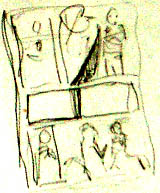Comic Tips!
If anyone wants to know more about creating comics, how to do their comics, and how to make their comics better, you should certainly go grab a copy of "Understanding Comics" by Scott McCloud. It's an absolutely wonderful piece of work, all done in comic form, and explains things very well. There is nothing in that book that I could explain better myself, so I won't even attempt it. The most I can do is to just make a list of suggestions based on what I've learned in my own experience as a comic artist and reader.
Scripting-
Scripting out a comic is incredibly useful. Especially if one is prone to spelling errors. I usually script out my comics a scene at a time. It doesn't set anything in stone, it's just good for figuring out the flow of everything and working out what text should be on what page and stuff like that.
 Thumbnails-
Thumbnails-
I just do thumbnails to plan out panel layouts on the page. The more you plan layouts, the better your layouts will be. More on layouts. . .
 Borders-
Borders-
They break up panels, create time and space, don't try making a comic without them.
 Text bubbles-
Text bubbles-
Without text bubbles, text just looks lazy. Text should be clear, readable, not too small, in some font that's easy to read, in some color that's easy to read, and please not in pencil..
Text should be in English if the comic is intended to be read by English speakers and NOT IN ANY OTHER LANGUAGE! Including sound effects!!
 Backgrounds-
Backgrounds-
Draw them. For the love of god.
Empty white space in every panel gets boring quite quickly. Backgrounds show WHERE characters are and what the world is like. A photoshop filter with psychodelic colors does not count as a background.
 Layouts-
Layouts-
Variety makes for interest.
Try different angles. Don't have any two panels on a page be from the same angle.
Art should reach to the sides of each frame. It really looks bad when it doesn't. Especially when it's a closeup of someone's eyeball.
Draw not only from different perspectives, but the distance from the camera to the characters is also important to change around.
And one last thing about layouts - if you don't write in Japanese, don't lay out your comic from right to left.
If you want more tips on layouts, I have a separate page for that.
 Dark, Light, and color-
Dark, Light, and color-
Looking at a full page that averages out into a bunch of greys is really boring. This happens far too often.
For black and white comics, my friend told me a rule that 20 percent of the image should either be black or white, and the other 80 percent should be of the other. This gives just enough blackness for the white to really seem white, or just enough whiteness for the black to really seem black. The further away from the 50/50, the less grey a page will appear and the more interested it will look.
In greyscale comics, or comics done in monotones, this is harder. There is a tendancy to outline everything in black and have that black be the only darkest shades on the page. DOn't!! A page looks so much better with that contrast between the black and white parts.
In colored comics, it's very tempting to just color things in generic tones. If you can mix all of the colors together and it comes up with the most generic grey, then chances are you're using quite average colors and the page has no specific point of interest.
The best thing to do, for all type of comics, is to consider the page as a work of art and treat the layout and color scheme of the entire thing as you would a single picture.
 Characters, plot, and story-
Characters, plot, and story-
For this I'm just going to list a bunch of things I'm sick of people doing.. Things that have been done to death so many times over.
Megatokyo and Penny Arcade ripoffs.
You and your friends sitting around being bored.
Amnesia with a dark mysterious past
Oh look there's a new student at school and he's hot.
Or from some other race.
Or has magical powers.
The villian is crazy. That's all the reason he needs for killing people.
And the hero is a ninja. Just because he decided to be one one day. Even though he lives in downtown New York.
All the magic spells have the same names as the ones in Final Fantasy.
And no further information is given on how they exactly work as the reader assumes everyone reading is familiar with the video games.
And there is angst.. So much angst with ten splash pages dedicated to it even before we know anything else about the characters
Which is nothing compared to the ten pages of blocks and blocks of text backstory and introduction that the reader is expected to wade through before arriving at the actual comic.
If there's anything else you want to know about comics, or if you want me to take a look at your comic, feel free to contact me.
Back
Random is God
 Thumbnails-
Thumbnails- Borders-
Borders- Text bubbles-
Text bubbles- Backgrounds-
Backgrounds- Layouts-
Layouts- Dark, Light, and color-
Dark, Light, and color- Characters, plot, and story-
Characters, plot, and story-